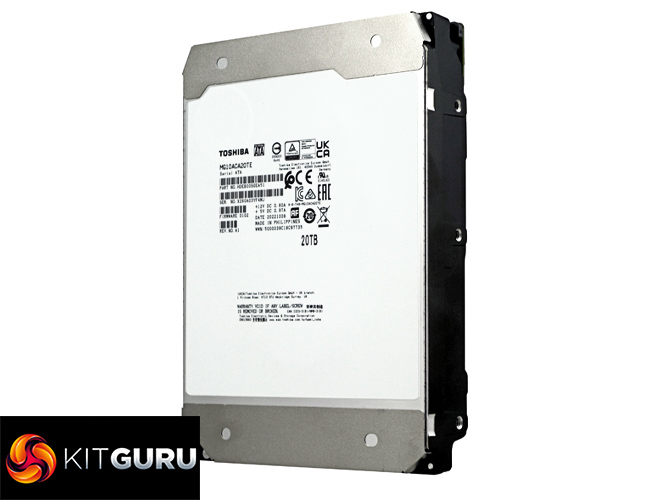The new flagship drive of Toshiba's MG10 family is the 20TB model. Offering 11.1% more capacity than the previous 18TB flagship model, the 20TB drive is compatible with a wide range of mixed random and sequential read and write workloads for cloud, hybrid-cloud and on-premises rack-scale storage. The drive uses Toshiba's Flux-controlled microwave-assisted magnetic recording (FC-MAMR) technology to increase write performance when dealing with the higher areal density discs that these very large-capacity drives use.
The 20TB M10 is officially rated as up to 268MB/s for transfer rates. We could confirm this figure and indeed better it with the default CrystalDiskMark Sequential test (QD32 T1) with result figures of 288MB/s for reads and 285MB/s for writes.
Being aimed at the enterprise segment, it comes as no real surprise to find that the 20TB MG10 has a few tricks up its sleeve to keep working in a 24/7 365-day environment. To maintain maximum performance during operations the drive supports Toshiba's Stable Platter and Dynamic Cache technologies. Stable Platter reduces vibrations by stabilising the motor shaft at both ends while Dynamic Cache optimises how the cache is allocated by a combination of a cache algorithm and onboard buffer management.
The MG series also make use of Persistent Write Cache Technology to protect data. If there is a power supply interruption while the drive is writing to the disc, the data is saved in the cache and written to the drive when the power is restored.
The 20TB MG10 is available in two sector formats 4Kn (MG10ACA20TA) and 512e (MG10ACA20TE) as well as Sanitize Instant Erase (SIE) and Self Encrypting Drive (SED) options.
We found the Toshiba MG10ACA20TE on ebuyer for £359.99 (inc VAT) HERE.
Discuss on our Facebook page HERE.
Pros
- Huge capacity.
- Drive technologies.
- 5-year warranty.
Cons
- All that new technology doesn't come cheap.
KitGuru says: Toshiba's latest flagship drive for the MG10 Enterprise focussed product line adds more capacity for the data centre environment. It features an interesting technology in Toshiba's Flux-controlled microwave-assisted magnetic recording (FC-MAMR), a technology which should enable even larger capacity drives in the future.
 KitGuru KitGuru.net – Tech News | Hardware News | Hardware Reviews | IOS | Mobile | Gaming | Graphics Cards
KitGuru KitGuru.net – Tech News | Hardware News | Hardware Reviews | IOS | Mobile | Gaming | Graphics Cards




